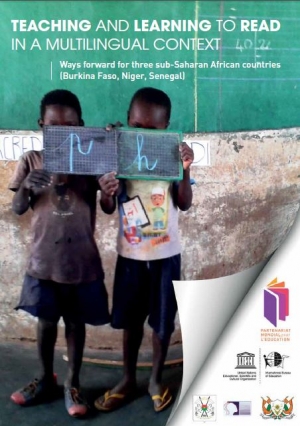Between November 2013 and May 2017, the International Bureau of Education (IBE-UNESCO) and the Ministries of Education of Senegal, Burkina Faso, Niger have been partnering in an ambitious capacity-building project geared toward the improvement of early grade reading / writing education. The
“Improving learning outcomes in early grades: integration of curriculum, teaching, learning materials and assessment” project has built upon the respective objectives of the Ministries of Education and drawn on the expertise of local and international reading / writing specialists over the past 3 years +.
Sponsored by the
Global Partnership for Education (GPE), the project has enabled and paved the way to elaborate upon and implement national action plans to improve early reading education, in line with larger national curricula reforms (launched in 2008 in Senegal, in 2015 in Niger and Burkina Faso). It was conceived as a service to be provided in two phases: a national and international diagnostic study enabling the formulation of country-specific recommendations; curriculum development and capacity-building activities in each country built on these orientations.
Phase 1: National and international diagnostic study (November 2013-December 2014)
The IBE- UNESCO, in charge of the diagnostic study, coordinated international and local experts with two aims:
- To identify the latest research findings in the area of early reading education internationally;
- To analyse both the national reading curriculum and classroom teaching practices observed and filmed within each country.
The results of this unprecedented study were released in a seminal 315-page research report,
‘Teaching and learning to read in a multilingual context: ways forward for three sub-Saharan African countries (Burkina Faso, Niger, Senegal)’ (
English and
French)
As a whole, the report identifies the elements required for successful early literacy acquisition, provides state-of-the-art knowledge on effective reading curricula and related curriculum issues, and formulates general as well as tailored
evidence-based recommendations. Two lines of action are highlighted
: quality teacher education and
quality curricula and teaching materials.
Phase 2: Curriculum development and capacity-building for high quality teaching (January 2015- May 2017)
One common priority identified, in the report’s conclusions and recommendations, was the imperative to empower teachers to deliver effective early reading instruction.
As a result of the reports, Burkina Faso, Niger and Senegal developed national action plans tailored to country-specific linguistic and educational contexts and needs. IBE-UNESCO provided technical assistance and capacity-building activities to help develop and implement quality curricula documents aligning with the targets defined by each country.
Country-specific productions
In Senegal, target deliverables include national orientations on teaching of reading / writing in French as a second language, a supporting document on the didactics of reading / writing in French for teacher trainers and a training resource-pack. All texts focus on the first three years of primary school. These tailored materials should guide policy-makers, practitioners, trainers, and supervisors in their efforts toward an optimal impact of reading / writing education by integrating innovations identified as critical, while still taking into account curriculum and training related constraints.
Senegal_Document d'orientations.pdf
Senegal_Dispositif de formation.pdf
Senegal_Document d'appui didactique.pdf
In Burkina Faso, three complementary documents have been elaborated by a Ministry-appointed team of Burkinabe experts: a pedagogical guide, a toolkit for teachers, and a training resource-pack aimed at teacher trainers. All documents are designed to promote an updated vision of content and methods and to support the improvement of curricula alignment.
Burkina Faso_Dispositif de formation.pdf
Burkina Faso_Boite à outils.pdf
Burkina Faso_Guide.pdf
In Niger, the focus has been on the design and production of two teacher training modules: CI-CP covering the first and second grades of primary school (pdf below) and CE1-CE2 covering the third and fourth (pdf below), as well as a corresponding practitioner’s guide (pdf below) enabling the successful translation of new training content into educational practices and a leaflet on the importance on reading aiming the educational community at large. All documents contribute to the implementation of the new national curriculum also launched in September 2015, notably by supporting capacity-building sessions planned for Autumn (Fall) 2016. These sessions provided school principals, supervisors, teacher trainers, and teachers with enhanced knowledge of effective reading instruction practices.
Niger_Dispositif de Formation.pdf
Niger_Guide de l'encadreur.pdf
Niger_Modules CE1/CE2.pdf
Niger_Booklet Apprendre à lire.pdf
Niger_Modules CI/CP.pdf
General outcomes
All involved parties recognise the significant impact of the IBE-UNESCO / GPE project on the outcomes of reading / writing education in each of the three partner countries. In addition to country-specific expected results, “Improving learning outcomes in early grades; integration of curriculum, teaching, learning materials and assessment” has generated important findings, hopefully valid beyond the national contexts and education systems at stake. The 39 month project aimed at enhancing knowledge in areas of gaps and strengths in early literacy curricula internationally.
